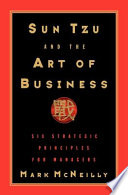

In 'Sun Tzu and the Art of Business', the author integrates the timeless wisdom of Sun Tzu's 'The Art of War' with modern business practices. The book serves as a guide for entrepreneurs, managers, and leaders seeking to...
Continue readingStrategic planning is a fundamental concept in both warfare and business. Sun Tzu emphasizes the importance of thorough preparation and understanding the environment before engaging in any battle or business endeavor. In...
Continue readingOne of Sun Tzu's key teachings is the necessity of knowing both your enemy and yourself. In the business world, this translates to understanding your competition. Successful businesses invest time in analyzing their comp...
Continue readingSun Tzu advocates for adaptability in the face of changing circumstances. In business, this means being prepared to pivot strategies in response to market shifts, consumer preferences, or unforeseen challenges. Companies...
Continue readingLeadership is a central theme in Sun Tzu's teachings. Effective leaders inspire their teams, foster collaboration, and create a culture of trust and respect. In business, strong leadership is essential for guiding teams ...
Continue readingEfficient resource management is critical for any successful business strategy. Sun Tzu teaches that resources, whether they are human, financial, or material, must be allocated wisely to ensure victory. In a business co...
Continue readingTiming can be the difference between success and failure. Sun Tzu stresses the significance of choosing the right moment to act, whether in battle or business. This involves recognizing opportunities and knowing when to ...
Continue readingSun Tzu highlights the value of alliances in achieving objectives. In the business world, forming strategic partnerships can lead to shared resources, expanded market reach, and enhanced credibility. Collaborating with o...
Continue readingThe reading time for Sun Tzu and the Art of Business depends on the reader's pace. However, this concise book summary covers the 7 key ideas from Sun Tzu and the Art of Business, allowing you to quickly understand the main concepts, insights, and practical applications in around 23 min.
Sun Tzu and the Art of Business is definitely worth reading. The book covers essential topics including Strategic Planning, Know Your Competition, Adaptability and Flexibility, providing practical insights and actionable advice. Whether you read the full book or our concise summary, Sun Tzu and the Art of Business delivers valuable knowledge that can help you improve your understanding and apply these concepts in your personal or professional life.
Sun Tzu and the Art of Business was written by Mark McNeilly.
If you enjoyed Sun Tzu and the Art of Business by Mark McNeilly and want to explore similar topics or deepen your understanding, we highly recommend these related book summaries:
These books cover related themes, complementary concepts, and will help you build upon the knowledge gained from Sun Tzu and the Art of Business. Each of these summaries provides concise insights that can further enhance your understanding and practical application of the ideas presented in Sun Tzu and the Art of Business.